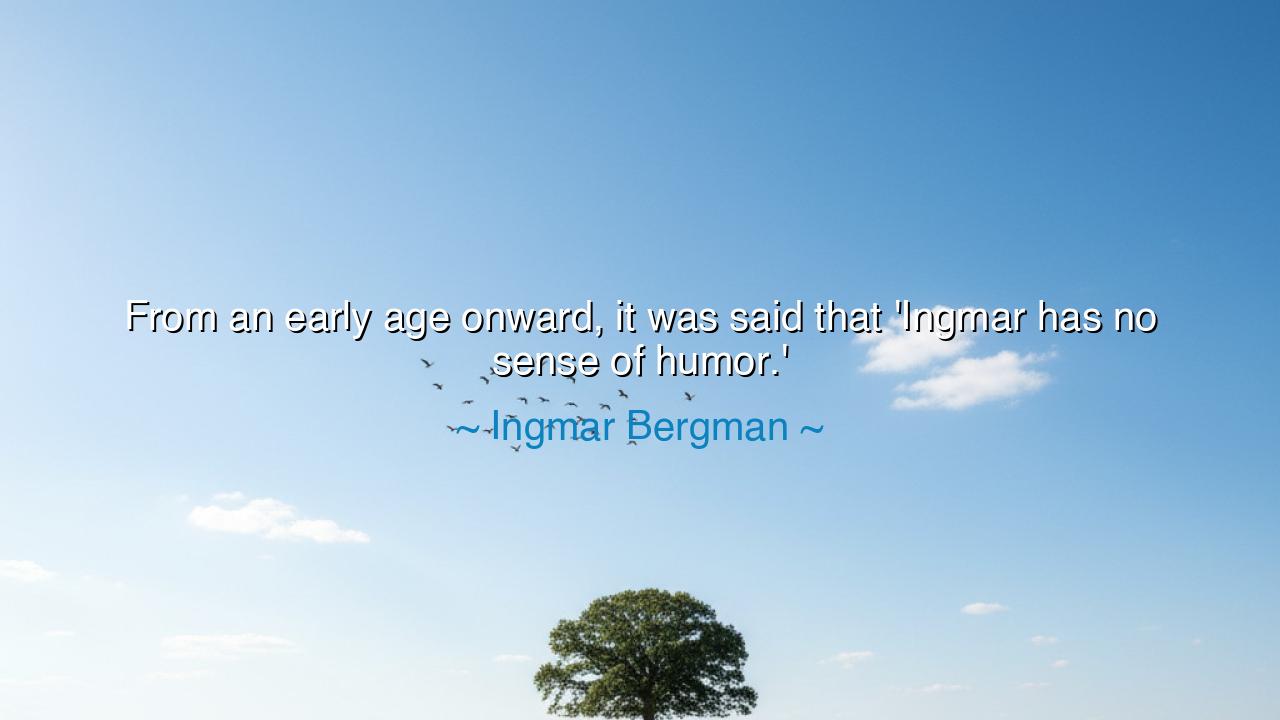
From an early age onward, it was said that 'Ingmar has no sense






“From an early age onward, it was said that ‘Ingmar has no sense of humor.’”
Thus spoke Ingmar Bergman, the solemn craftsman of the soul, whose films probed the hidden corners of fear, faith, and loneliness. In this simple confession lies a deep paradox — for though he was accused of lacking humor, he possessed instead a rarer gift: the courage to face truth without flinching. The laughter that others sought in him was replaced by contemplation; his smile was inward, not loud, his wit subtle, not showy. And in that quiet gravity, he found something that laughter alone cannot offer — the profound music of the human heart in all its pain and beauty.
To be told one “has no sense of humor” is often to be misunderstood. For many mistake lightness for joy, and jest for wisdom. Yet there are souls who are born not to dance upon the surface, but to dive into the depths — those who see life not as a jest, but as a question. Bergman was one such soul. From childhood, he felt the weight of existence, the mystery of good and evil, and the shadow of the divine. Where others laughed at the absurd, he searched for its meaning. And though the world labeled him humorless, it was not because he despised laughter — but because he revered it. For true laughter, as he might have said, cannot exist without understanding sorrow.
In the ancient world, the philosopher Heraclitus was called “the weeping sage.” He looked upon the folly of men and wept, while his counterpart Democritus laughed at it. Yet both saw the same world — only through different lenses. Bergman, like Heraclitus, felt too deeply to mock. His humor was not absent, but transformed: it became irony tempered by compassion, a solemn recognition of life’s contradictions. When he crafted films like The Seventh Seal or Wild Strawberries, he offered not jokes but revelations — that even despair can possess beauty, and that silence may speak louder than laughter.
It is said that humor and darkness are twins born of the same mother — experience. The difference lies in how the heart responds to the weight of the world. Some answer with laughter; others with reflection. Bergman’s “lack of humor” was, in truth, a form of spiritual seriousness — an unwillingness to trivialize the mystery of life. Just as the ancient prophets did not jest with the divine, Bergman did not jest with human suffering. He walked a path few could endure, holding a mirror to anguish so that others might see their own humanity reflected there.
Consider the tale of Søren Kierkegaard, the Danish philosopher, who also bore the label of humorless melancholy. Yet Kierkegaard wrote that “the task must be to laugh at oneself, but not to scorn life.” He, like Bergman, saw that laughter divorced from truth is shallow, but laughter born of honesty is divine. Bergman’s art often sought that divine laughter — not the laughter of amusement, but of recognition, the laughter that comes when the soul suddenly understands itself. Those who called him humorless did not see that his work was filled with the quiet humor of being human — the tender absurdity of love, the folly of pride, the irony of faith and doubt.
The origin of this quote lies not in complaint, but in self-awareness. Bergman, who grew up under the stern discipline of a Lutheran pastor, was taught that joy must be earned through struggle. His childhood was a theater of rules, silence, and reflection — a world that left little room for play. Yet from that soil of solemnity grew the fruits of genius. He did not laugh often, but he understood the essence of laughter — that it is born not from denial, but from survival. His films, though grave, are ultimately acts of mercy; they show that even in despair, beauty endures, and that to face life without illusion is itself a form of triumph.
So let this be the teaching drawn from Ingmar Bergman’s lament:
-
Do not mistake seriousness for sorrow, for depth is the twin of joy.
-
Honor the quiet souls, those who do not laugh loudly but love deeply.
-
Seek meaning before amusement, for laughter that knows truth heals, while laughter without truth forgets.
-
Understand that art, like life, must balance light and shadow — for humor is not the absence of gravity, but its companion.
Thus spoke Bergman, whose silence was richer than most men’s laughter. His so-called humorlessness was in fact a devotion to the sacred weight of being alive — a reverence for the mystery of existence that words and jokes could not contain. And so, O listener, remember this: not every smile is joy, nor every solemn gaze despair. Some who seem joyless carry within them the deepest laughter — the laughter that does not echo in the air, but in the soul. For even the weeping sage, if you listen closely, is laughing quietly with the divine.






AAdministratorAdministrator
Welcome, honored guests. Please leave a comment, we will respond soon